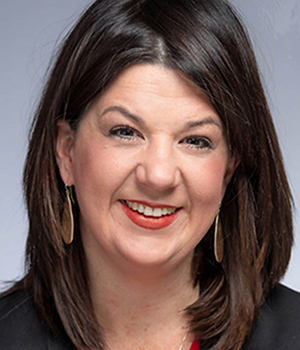Heather Reynolds to testify before Ways and Means Subcommittee on Work and Welfare
Heather Reynolds, the Michael L. Smith Managing Director of the University of Notre Dame’s Wilson Sheehan Lab for Economic Opportunities (LEO), will testify before the House Ways and Means Subcommittee on Work and Welfare on Wednesday (March 29). The hearing, “Welfare is Broken: Restoring Work Requirements to Lift Americans Out of Poverty,” begins at 2 p.m. and will be livestreamed via webcast here.
This hearing, which will be hosted by House Committee on Ways and Means Chairman Rep. Jason Smith and Work and Welfare Subcommittee Chairman Rep. Darin LaHood, will focus on the Temporary Assistance for Needy Families (TANF) program, including the program’s structure and effectiveness in lifting families out of poverty.

Reynolds was invited as an expert on poverty to speak from her experience in both the service provider and research spaces. LEO works with service providers across the country to build rigorous evidence for programs designed to move people permanently out of poverty. Prior to joining LEO, Reynolds spent 14 years as CEO of Catholic Charities Fort Worth, where she saw firsthand the disconnect that often exists between policy and on-the-ground work.
During her testimony, Reynolds will discuss the need for research-informed policy decisions by citing several LEO studies that demonstrate that the most effective way to help low-income Americans out of poverty is through pairing flexible financial assistance and case management. One example is Padua — a holistic case management program designed by Catholic Charities Fort Worth to address the unique assortment of barriers faced by families in poverty. LEO recently completed a randomized, controlled trial on Padua that showed Padua clients were 25 percent more likely to be employed, and unemployed individuals who were offered Padua services earned 46 percent more, were 60 percent more likely to be stably housed 24 months later and experienced a sharp decline in credit card debt that persists over time.
Reynolds will give examples of other such programs that have found similar success including the Bridges to Success program of Rochester, New York, which provides its low-income residents with economic mobility mentors that can help them coordinate community support services and move out of poverty one critical life issue at a time. Results from that study showed that participants, when compared to a control group, were more likely to be employed, with that trend continuing over time.
Reynolds’ testimony will emphasize how critical it is for policymakers to use evidence when making decisions about not only TANF, but anti-poverty programs across the board.
“At LEO, we have more than 90 research projects building evidence to help us understand what works,” Reynolds said. “We take the most creative leaders in this space and design research studies, studying the impact of their services. It is hard enough to run a social service agency and then add on top of that a research study. These organizations do it because they believe if they can understand their impact, it can be used to scale and replicate their work. Many of our provider partners serve TANF recipients who work and poor families who work but do not qualify for TANF. To get people to move out of poverty (whether that includes TANF or not), we need evidence-based programs that work.”
Contact: Tracy DeStazio, assistant director of media relations, 574-631-9958 or tdestazi@nd.edu
Latest ND NewsWire
- From reaction to resolution: The future of allergy treatmentTwelve-year-old Lauren Eglite was thrilled to attend a Notre Dame football game with her father, Erik, in 2017, even though her acute peanut allergy demands constant vigilance. She was even more excited when the stadium’s brand-new video board aired an NBC Fighting…
- Notre Dame student uses ‘American Ninja Warrior’ spotlight to fight world hunger via his nonprofitOn July 14 (Monday), a University of Notre Dame business student will compete in the semifinal round of NBC’s “American Ninja Warrior” to advocate for an end to world hunger, an ambition he works toward by making knotted dog toys and collecting donations to his nonprofit.
- In sub-Saharan Africa, 1 in 6 cancer medications found to be defectiveSerious quality defects were found in a significant number of cancer medications from sub-Saharan Africa, according to new research from the University of Notre Dame.
- Alumni Association awards 2025 Lennon Life PrizesThe Notre Dame Alumni Association recognized nine alumni clubs as recipients of the Lennon Life Prize — part of the Chuck and Joan Lennon Gospel of Life Initiative, a set of programs focused on encouraging the University’s dedicated network of clubs to uphold the value of life at all stages.
- Prioritizing prenatal care may decrease low birth weight outcomes in The Gambia, Notre Dame research findsA new study co-authored by University of Notre Dame researchers highlights the importance of prenatal care for improving the health of mothers and newborns, providing evidence that can inform policy.
- Navigating the waters of peace: Researchers address challenges, opportunities in implementation of Colombia's Peace AgreementNearly half of the commitments outlined in Colombia's historic peace accord face significant challenges and may not happen in time unless policymakers make several key interventions, warns a new report from Notre Dame's Peace Accords Matrix. The report offers a blueprint to salvage an accord that has lagged behind its implementation deadlines, putting its legacy at risk. It highlights timely fixes that can strengthen the agreement.












